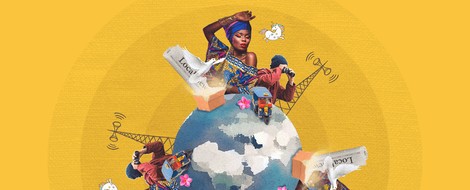Your podcast discovery platform
Curious minds select the most fascinating podcasts from around the world. Discover hand-piqd audio recommendations on your favorite topics.

piqer for: Boom and bust Global finds
I am a Dutch journalist, writer and photographer and cover topics such as human rights, poverty, migration, environmental issues, culture and business. I’m currently based in The Hague, The Netherlands, and frequently travel to other parts of the world. I have also lived in Tunisia, Egypt, Kuwait and Dubai.
My work has been published by Al Jazeera English, BBC, The Atlantic's CityLab, Vice, Deutsche Welle, Middle East Eye, The Sydney Morning Herald, and many Dutch and Belgian publications.
I hold an MA in Arabic Languages and Cultures from Radboud University Nijmegen and a post-Master degree in Journalism from Erasmus University Rotterdam. What I love most about my work is the opportunities I get to ask loads of questions. Email: [email protected]
Yemeni Women About How Their Lives Changed During The War
The podcast Voices of the Middle East and North Africa promises to take listeners “beyond the reductive stereotypes of the Sword and the Veil, oil riches and terrorism, backwardness and war to help create a fuller understanding of reality.” It tries "bridging the chasm of misunderstanding that currently exists between our native and adoptive lands.”
I can recommend listening to the second part, which starts after 36 minutes. It consists of interviews with five Yemeni women who are involved in women and feminist activism. Like the presenter said:
The names, voices and stories of Yemenis are hardly at the centre of this conflict’s coverage.
The program also gives some background about the war between the Saudi Arabia led coalition and the unofficial support by Iran to the Houthi rebels, who currently control the capital Sana’a and much of the north.
Since the war, many women started to work outside the home for the first time and opened businesses, which was rare before. They talk about the economic hardships they faced since the war, the bombing by the Saudi led coalition, intimidation and censorship.
Amal Abdelrahman, a leader of the association Mothers of the Abductees, has been trying to find her cousin who was probably abducted by the Houthis two years ago.
Can I finish my lunch, he asked, but they did not allow him. We haven’t heard from him since.
After she spoke to the media about a friend who was on a hunger strike to protest torture in prison, Houthi militants threatened to arrest her and her ten years old son.
Other prisoners have been abducted by the government forces. There are probably around 15,000 political prisoners in the country.
Nisma Mansour, a student from Aden, is involved in an organisation that pushes for women’s rights and for a peaceful resolution of the conflict.
Women are not just sitting at home and saying let the men do the job. No, we are doing it. We are not just the victims. We’re trying to make the situation as liveable as possible.
